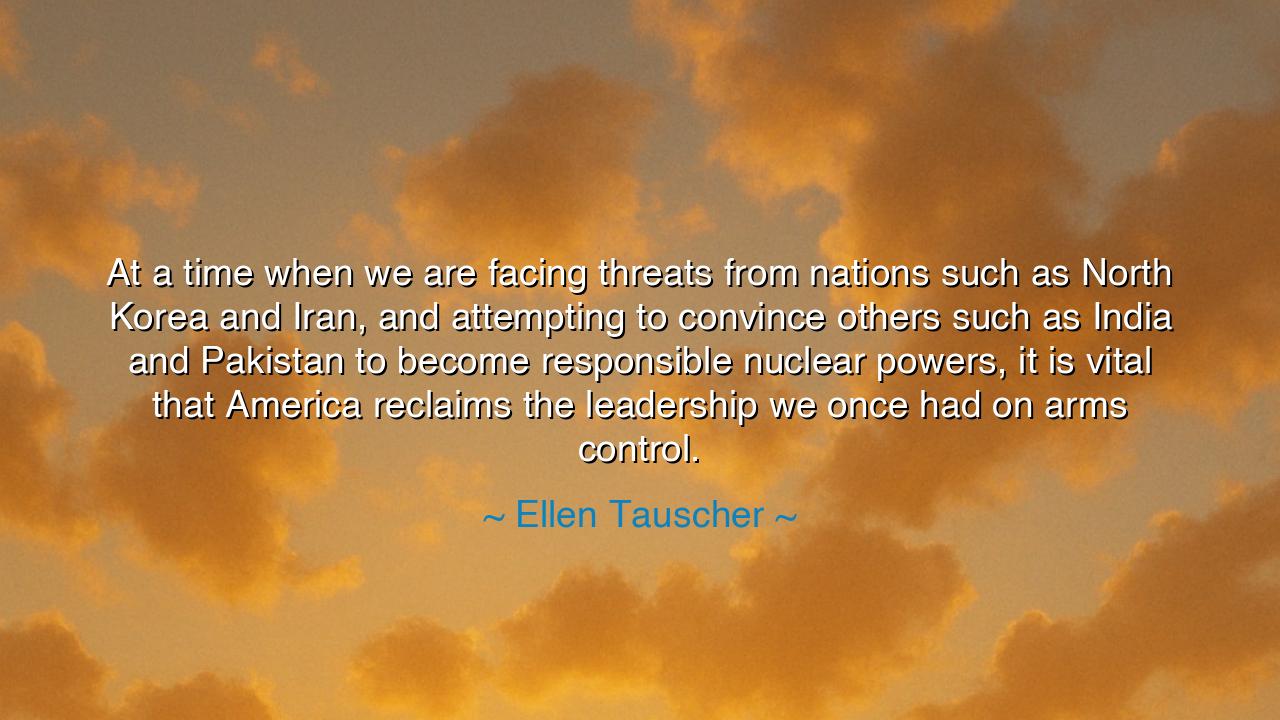
At a time when we are facing threats from nations such as North
At a time when we are facing threats from nations such as North Korea and Iran, and attempting to convince others such as India and Pakistan to become responsible nuclear powers, it is vital that America reclaims the leadership we once had on arms control.






The words of Ellen Tauscher—“At a time when we are facing threats from nations such as North Korea and Iran, and attempting to convince others such as India and Pakistan to become responsible nuclear powers, it is vital that America reclaims the leadership we once had on arms control”—echo with the solemn wisdom of a stateswoman who saw that true strength lies not merely in power, but in the stewardship of power. Beneath these words burns the ancient truth that peace is not the absence of weapons, but the presence of discipline, trust, and moral leadership. Tauscher spoke at a time when the shadow of nuclear proliferation hung once again over the world—a reminder that even the mightiest nations must choose between domination and responsibility.
To “reclaim leadership” in her words is not a call to arrogance, but to moral renewal. In the modern world, where the atom has been split and human hands hold the power to extinguish nations in moments, leadership cannot be defined by military superiority alone. Tauscher calls upon America—and by extension, all nations of conscience—to lead not through fear, but through example. The great paradox of strength is that it must be restrained by wisdom, else it becomes self-destruction. To lead in arms control is to recognize that every weapon built without purpose weakens the soul of civilization.
The origin of her quote lies in the long struggle for balance that began in the ashes of Hiroshima and Nagasaki. When the world first saw the blinding light of nuclear fire, humanity realized that science had outpaced its own morality. The Cold War became an age of terror and caution alike, when leaders like John F. Kennedy and Mikhail Gorbachev sought treaties to tame the monstrous forces they themselves had helped unleash. Tauscher, inheriting the legacy of those peacemakers, understood that leadership in arms control is not weakness—it is the highest act of courage, the refusal to let fear dictate the future.
History has shown what happens when leadership falters in this sacred duty. In the 20th century, nations armed themselves in spirals of suspicion, each believing safety lay in superiority. But superiority bred paranoia, and paranoia bred catastrophe. The Cuban Missile Crisis nearly brought the world to annihilation—yet it was resolved not by weapons, but by restraint, communication, and the willingness to step back from the brink. In that moment, America’s strength came not from its missiles, but from its wisdom. This is the leadership Tauscher calls us to reclaim: the leadership of reason over rage, of courage over pride.
Her reference to North Korea, Iran, India, and Pakistan speaks to the global complexity of the 21st century, where power has multiplied but wisdom has not always kept pace. These nations, each driven by their own histories and fears, remind us that arms control is not a regional concern—it is the shared responsibility of humanity. For as long as one nation seeks dominion through destruction, all others live under the same sword. Tauscher’s vision is therefore not merely American—it is universal, rooted in the idea that peace is indivisible. A world where one lives in fear is a world where none are truly safe.
Her words are also a moral mirror. They remind us that the failure of arms control is not a failure of politics—it is a failure of character. Nations, like individuals, must learn self-restraint. The mightiest must be the most humble, for only humility guards against hubris. Tauscher’s plea is not for treaties alone, but for a renewal of conscience—to remember that every nuclear weapon built is a monument to fear, and every treaty signed is a triumph of faith in humanity’s better nature.
The lesson we take from her words is clear: leadership in the modern age demands both strength and stewardship. To be powerful is not to threaten, but to protect. To lead is not to command, but to guide others toward safety and understanding. The same truth applies to every person: power, in any form—whether of words, position, or influence—must be governed by purpose. In a world still trembling with the echoes of past wars, each of us is called to be a custodian of peace in our own realm, to meet conflict with dialogue, and pride with patience.
Thus, Ellen Tauscher’s call transcends politics and becomes a teaching for all ages: true greatness is not in the hand that builds the weapon, but in the heart that restrains it. When nations—and individuals—learn to temper their strength with wisdom, the world steps one breath closer to peace. To reclaim leadership, therefore, is to reclaim humanity—to once again believe that the light of reason can overcome the darkness of fear, and that the future belongs not to those who arm, but to those who understand.






AAdministratorAdministrator
Welcome, honored guests. Please leave a comment, we will respond soon